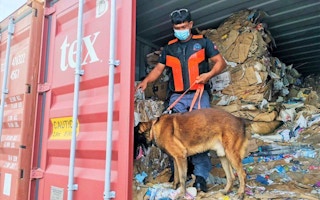United States-based environmental advocacy Ocean Conservancy agreed on Wednesday to “restorative action” by correcting false narratives set by a seven-year-old report, which blamed global plastic pollution solely on five Asian countries.
To continue reading, subscribe to Eco‑Business.
There's something for everyone. We offer a range of subscription plans.
- Access our stories and receive our Insights Weekly newsletter with the free EB Member plan.
- Unlock unlimited access to our content and archive with EB Circle.
- Publish your content with EB Premium.
The Stemming the Tide: land-based strategies for a plastic-free ocean study published in 2015 is often cited by news reports that China, Indonesia and the Philippines are the world’s top three largest sources of plastic leaking into the ocean, followed by Thailand and Vietnam. The research overlooks the role of industralised territories such as the United States, Japan and Europe in plastic overproduction and waste exports to developing countries.
When China restricted waste imports in 2018, wealthy nations looked to the super power’s Southeast Asian neighbours as alternative dumping grounds.
The shipments go against the Basel Convention, an international treaty that protects developing countries from illegal dumping deposits of hazardous and other waste from the developed world.
“We created a narrative about who is responsible for the ocean plastic pollution crisis – one that failed to acknowledge the outsized role that developed countries, especially the United States, have played and continue to play in generating and exporting plastic waste to this very region,” Ocean Conservancy said in a previous statement.
“We apologise for the framing of this report and unequivocally rescind any direct or indirect endorsement of incineration as a solution to ocean plastic pollution.”
“
We apologise for the framing of this report and unequivocally rescind any direct or indirect endorsement of incineration as a solution to ocean plastic pollution.
Ocean Conservancy
Nearly two months after its public apology, the non-profit pledged to prioritise plastic reduction policies, moving resources to zero-waste solutions and denouncing waste-to-energy (WTE) and chemical recycling.
Such solutions are emerging rapidly in the US as they are portrayed to be a “silver bullet solution,” Nicholas Mallos, vice president of ocean plastics for Ocean Conservancy, told Eco-Business.
“This is a huge problem because it diverts attention and resources from improving mechanical recycling. We are looking forward to collaborating with [anti-waste burning advocacy group] Global Alliance for Incinerator Alternatives (GAIA) and others on these shared priorities through joint communications and advocacy efforts.”
A win against waste colonialism
Ocean Conservancy’s report retraction is an opportunity to interrupt decades of “waste colonialism”, said Froilan Grate, GAIA Asia Pacific coordinator.
“Waste colonialism” is the process by which developed countries show dominance over less developed countries through toxic waste exports, leaving the receiving and often, ill-equipped countries to deal with the waste, severely affecting their communities and environment.
In 2019, the Philippines grappled with a long-standing row with Canada for it to repatriate the remaining 69 of the 103 container vans of waste exports that came illegally to Manila and Subic ports six years prior. Canada finally ordered the return of the trash that year.
Malaysia, the world’s main destination for plastic waste after China, likewise returned as much as 3,000 tonnes of waste back to the countries of origin in 2019.
Plastic waste mainly from the US, United Kingdom, Australia and Canada were also found in 2019 to have contaminated the local food chain in Indonesia.
Christie Keith, GAIA International Coordinator, added that responsibility for the plastic waste crisis also lies with the corporations that make and push out increasing quantities of plastic.
Consumer goods giants Coca-Cola, Pepsico, and Unilever emerged as the world’s biggest plastic polluters, according to an annual survey of plastic debris found on city streets, parks, forests, beaches, and coastal areas around the world.
Coca-Cola and Pepsico have topped the global plastic polluter audit for four consecutive years but it was the first time for Unilever to claim the third spot last year.
The plastic littering the planet continues despite efforts by the three firms to recover and remove from the environment the same amount of plastic waste created by the consumption of their products.
Coca-Cola, whose plastic waste totals more than the next two top polluters combined, committed to collect one bottle for every one sold by 2030. Pepsico vowed to halve its use of virgin plastic by 2030, while Unilever made the same pledge to be achieved by 2025.










